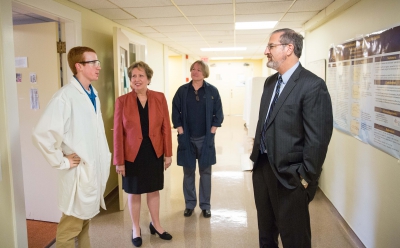August Highlights
Welcoming a first-time visitor, funding to focus on the sexual health of cancer survivors, addressing the primary care provider shortage, more.
UMSN had the wonderful surprise of a visit from new U-M President Schlissel in late August. He checked in  on construction of the new academic building—on the day the final beam of structural steel was placed. Then he met academic and student services staff and administrators and observed a simulation in the Clinical Learning Center (CLC). “President Schlissel seemed down-to-earth and genuinely interested in what we are doing,” said CLC Director and Clinical Assistant Professor Michelle Aebersold, PhD, RN. “He understood simulation and debriefing as powerful teaching tools.”
on construction of the new academic building—on the day the final beam of structural steel was placed. Then he met academic and student services staff and administrators and observed a simulation in the Clinical Learning Center (CLC). “President Schlissel seemed down-to-earth and genuinely interested in what we are doing,” said CLC Director and Clinical Assistant Professor Michelle Aebersold, PhD, RN. “He understood simulation and debriefing as powerful teaching tools.”
 Debra L. Barton, RN, PhD, AOCN, FAAN, UMSN’s Mary Lou Willard French Professor of Nursing, received a new grant from The Breast Cancer Research Foundation. Her project, “Enhancing sexual health in female cancer survivors,” aims to create a comprehensive approach to sexual health that will be individualized to each woman’s needs. The intervention will address physiologic changes for patients dealing with vaginal dryness and pain after their diagnosis and treatment, psychosocial changes resulting in negative body image and sexual self-image, and decreases in sexual energy and motivation. “I am extremely grateful for the support I have received from the Breast Cancer Research Foundation over the past six years,” says Dr. Barton. “This funding has allowed me to explore mechanisms of action (both physiologic and psychosocial) for two different interventions that have been evaluated in large phase III multi-site clinical trials. I am encouraged that the phase III study most recently completed, evaluating vaginal DHEA (a pro-hormone) for symptoms of vaginal atrophy in female cancer survivors, has yielded some potentially practice-changing results, and primary and secondary outcome data were presented orally at two different international oncology conferences this summer.”
Debra L. Barton, RN, PhD, AOCN, FAAN, UMSN’s Mary Lou Willard French Professor of Nursing, received a new grant from The Breast Cancer Research Foundation. Her project, “Enhancing sexual health in female cancer survivors,” aims to create a comprehensive approach to sexual health that will be individualized to each woman’s needs. The intervention will address physiologic changes for patients dealing with vaginal dryness and pain after their diagnosis and treatment, psychosocial changes resulting in negative body image and sexual self-image, and decreases in sexual energy and motivation. “I am extremely grateful for the support I have received from the Breast Cancer Research Foundation over the past six years,” says Dr. Barton. “This funding has allowed me to explore mechanisms of action (both physiologic and psychosocial) for two different interventions that have been evaluated in large phase III multi-site clinical trials. I am encouraged that the phase III study most recently completed, evaluating vaginal DHEA (a pro-hormone) for symptoms of vaginal atrophy in female cancer survivors, has yielded some potentially practice-changing results, and primary and secondary outcome data were presented orally at two different international oncology conferences this summer.”  Aebersold, PhD, RN, director of UMSN’s Clinical Learning Center, explains why virtual learning has many benefits including exposing students to numerous situations, convenience, and opportunities to improve communication and interdisciplinary collaboration. "If you want to teach nursing students how to delegate, how to practice their leadership skills, how to respond to an emergency situation and direct their team members, it's a great learning environment," says Dr. Aebersold.
Aebersold, PhD, RN, director of UMSN’s Clinical Learning Center, explains why virtual learning has many benefits including exposing students to numerous situations, convenience, and opportunities to improve communication and interdisciplinary collaboration. "If you want to teach nursing students how to delegate, how to practice their leadership skills, how to respond to an emergency situation and direct their team members, it's a great learning environment," says Dr. Aebersold. “Nurses make up between 50 and 80 percent of the health workforce in Sub Saharan Africa yet resources to support building nursing capacity are still very sparse,” says Sue Anne Bell, PhD, FNP-BC. Bell is a recent UMSN PhD graduate and will be joining the faculty in the fall as an assistant research scientist and lecturer. Bell recently led a presentation on “Evaluation of student satisfaction with an emergency nursing education pilot program in Ghana” at the 2014 Medical Education Partnership Initiative (MEPI) Symposium in Mozambique. MEPI, with funding and support from multiple U.S. government agencies, was launched to fund 13 medical schools in 12 African countries to strength health systems in those countries. “I'm happy that our U-M partnership with Kwame Nkrumah University of Science and Technology in Ghana has placed a strong emphasis on building the entire healthcare team as a unit,” says Dr. Bell. Read more about Bell’s work in Ghana.
“Nurses make up between 50 and 80 percent of the health workforce in Sub Saharan Africa yet resources to support building nursing capacity are still very sparse,” says Sue Anne Bell, PhD, FNP-BC. Bell is a recent UMSN PhD graduate and will be joining the faculty in the fall as an assistant research scientist and lecturer. Bell recently led a presentation on “Evaluation of student satisfaction with an emergency nursing education pilot program in Ghana” at the 2014 Medical Education Partnership Initiative (MEPI) Symposium in Mozambique. MEPI, with funding and support from multiple U.S. government agencies, was launched to fund 13 medical schools in 12 African countries to strength health systems in those countries. “I'm happy that our U-M partnership with Kwame Nkrumah University of Science and Technology in Ghana has placed a strong emphasis on building the entire healthcare team as a unit,” says Dr. Bell. Read more about Bell’s work in Ghana.





